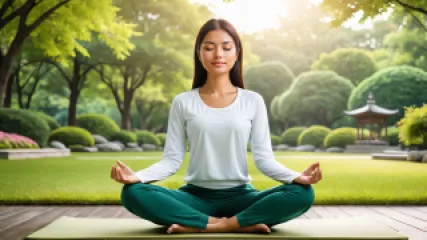5 Simple Stress Management Tips
Introduction:
Life is full of challenges and stressors that can take a toll on our mental and emotional well-being. Finding effective techniques for relaxation and stress management is crucial for maintaining a healthy lifestyle. In this tutorial, we will explore five simple stress management tips that can help you find tranquility amidst the chaos of everyday life. By incorporating these techniques into your daily routine, you can enhance your mental health and develop essential coping skills.
1. Deep Breathing Exercises
One of the simplest and most effective techniques for relaxation is deep breathing. Deep breathing exercises help to activate the body's relaxation response, reducing stress and promoting a sense of calmness.
To practice deep breathing:
- Find a quiet and comfortable place to sit or lie down.
- Close your eyes and take a slow, deep breath in through your nose, counting to four as you inhale.
- Hold your breath for a moment, and then exhale slowly through your mouth, counting to four.
- Repeat this process several times, focusing on your breath and allowing any tension or stress to melt away with each exhale.
Deep breathing exercises can be done anywhere and at any time, making them a convenient tool for stress relief. Incorporate this practice into your daily routine or use it as a quick technique to calm yourself during moments of anxiety or overwhelm.
2. Progressive Muscle Relaxation
Progressive muscle relaxation is a technique that involves systematically tensing and relaxing different muscle groups to promote relaxation and reduce physical tension.
To practice progressive muscle relaxation:
- Find a comfortable position and close your eyes.
- Start by tensing the muscles in your toes and feet, holding the tension for a few seconds, and then releasing it.
- Move your focus up to your calves and thighs, repeating the process of tensing and relaxing the muscles.
- Continue this pattern, working your way up through the different muscle groups in your body, including your abdomen, chest, arms, shoulders, and face.
- Pay attention to any areas of tension or discomfort and intentionally release the tension as you progress.
Progressive muscle relaxation can help you become more aware of the physical sensations of stress and tension in your body. By practicing this technique regularly, you can develop the ability to consciously release tension and promote a state of relaxation.
3. Mindfulness Meditation
Mindfulness meditation is a powerful technique for stress management and overall well-being. It involves focusing your attention on the present moment, without judgment or attachment to thoughts or emotions.
To practice mindfulness meditation:
- Find a quiet and comfortable space where you can sit or lie down.
- Close your eyes and bring your attention to your breath, noticing the sensation of each inhale and exhale.
- If your mind starts to wander, gently redirect your focus back to your breath without judgment.
- Expand your awareness to include the sensations in your body, sounds in your environment, and any thoughts or emotions that arise.
- Continue to observe these experiences with an attitude of curiosity and acceptance.
Mindfulness meditation can help you cultivate a greater sense of calmness and clarity, allowing you to respond to stressors with more resilience and presence. Regular practice can also improve your overall mental health and well-being.
4. Engage in Physical Activity
Physical activity is not only beneficial for your physical health but also plays a crucial role in stress management. Engaging in regular exercise releases endorphins, which are natural mood boosters and stress relievers.
Consider incorporating the following stress-relieving exercises into your routine:
- Yoga: Yoga combines physical movement, breathwork, and mindfulness, making it an excellent practice for stress reduction.
- Walking or Jogging: Going for a walk or jog in nature can help clear your mind and provide a sense of tranquility.
- Dancing: Dancing not only gets your body moving but also allows you to express yourself creatively and release tension.
- Aerobic Exercises: Activities like cycling, swimming, or kickboxing can help you release pent-up energy and reduce stress levels.
Find an activity that you enjoy and make it a regular part of your routine. Aim for at least 30 minutes of moderate-intensity exercise most days of the week to reap the maximum stress-relieving benefits.
5. Practice Self-Care
Self-care is an essential component of stress management and overall well-being. By prioritizing self-care practices, you can recharge and replenish your energy, allowing you to better cope with stressors.
Consider incorporating the following self-help practices into your daily routine:
- Journaling: Writing down your thoughts, feelings, and experiences can help you process emotions and gain clarity.
- Engaging in Hobbies: Make time for activities that bring you joy and help you relax, such as painting, playing an instrument, or gardening.
- Connecting with Loved Ones: Spend quality time with family and friends, nurturing relationships and fostering a sense of belonging.
- Setting Boundaries: Learn to say no and prioritize your needs, ensuring that you have time and energy for self-care.
Remember that self-care looks different for everyone. Find practices that resonate with you and make them a non-negotiable part of your routine. Prioritizing self-care will not only benefit your mental health but also enhance your ability to manage stress effectively.
Summary:
Stress management is crucial for maintaining a healthy and balanced life. By incorporating these five simple stress management tips into your daily routine, you can develop effective coping skills and find tranquility amidst the chaos. Remember to practice deep breathing exercises, progressive muscle relaxation, mindfulness meditation, engage in physical activity, and prioritize self-care. These techniques for relaxation will not only help you reduce stress but also promote overall mental well-being. Start implementing these stress-relieving practices today and reap the benefits of a calmer and more peaceful life.






